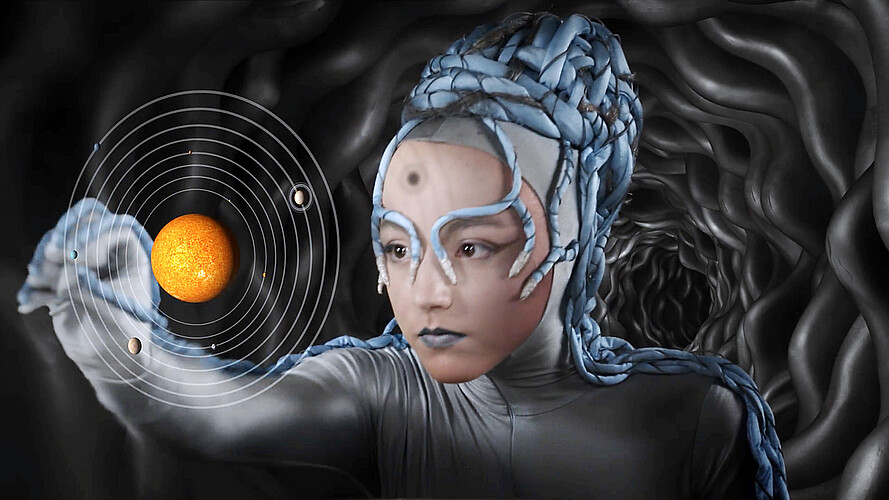The woman who flew into space from her apartment: SF worldbuilding from a feminist perspective
Vanina Saracino und Prof. Nina Fischer
Science fiction (SF) has always been preoccupied with the invention of new worlds—of DIY cosmologies imagining future scientific and technological advances leading to major social and environmental changes. However, as author Ursula K. Le Guin has often stressed, SF is not a prediction of the future, but rather a thought experiment on the present with strong descriptive and analytic qualities; it thus mirrors the concerns and hopes of some, but it also exacerbates the intersectional discrimination and traumas of many across different eras. The fact that the mainstream production of SF has historically been Western, white, heterosexual, and maledriven, is further evidence of how the dominant narratives have actively excluded other speculative fabulations about the future—the feminist, queer, indigenous perspectives, among others.
The woman who flew into space from her apartment will unfold as a nonexhaustive survey offemale perspectives on science fiction in literature,cinema, and visual arts, attempting to highlight the unique narratives of empowerment—feminist, decolonial, and environmental—that have been too often overlooked, and that thrive outside the genre stereotype of intergalactic wars and narratives of scarcity or escapism. Our convenings will take place around speculative fabulations that breed far from the dominant narratives, particularly stressing women’s contribution to the genre across different eras and artistic forms of expression, unveiling SF’s potential to illustrate and understand the present, to create a vocabulary of resistance and a visual culture against discrimination and colonial power, activating the narratives toward a more just future for all critters on Terra and beyond. The title of the seminar is a word pun on Ilya Kabakov’s iconic installation The man who flew into space from his apartment (1984).
We will gather bi-weekly at the Floating (Berlin), a unique site of urban practice on and in the rainwater retention pool of former Berlin Tempelhof airport, active since 2018. In this self-organized space and group, practitioners from a wide range of backgrounds meet to collaborate, engage, embrace the complexities and navigate the entanglements of the world, imagining and creating different forms of living, while bringing non-disciplinary, radical, and collaborative programs to the audiences.
Planned activities within the seminar include visits to related exhibitions, roundtables with invited artists, collective readings of selected texts, and a series of evening film screenings unfolding in close connection with the seminar Cyborg Futures: cross-disciplinary positions on human/ machine-fusions in contemporary art organized by Constantin Hartenstein and the UdK Film Institute. The woman who flew into space from her apartment will also serve as a departure point for the development of an exhibition taking place in indoor and outdoor public spaces across Berlin, in the summer of 2022. The students will have the possibility to choose either the realization of a practical or a theoretical work related to the topics approached throughout the semester.
Information
Wednesday, 10 AM–1 PM, bi-weekly
First day: 27.04.2022
Further days: 4.05, 18.05, 8.06, 22.06, 29.06, 13.07
Location: Floating (Lilienthalstraße 32, 10965, Berlin)
The seminar is obligatory for students of the class experimental film and media art, other students of UDK and guests on request.
Max. 20 partcipants
Language: english
Please register in advance under: ni.fischer(at)udk-berlin.de
Vanina Saracino
Vanina Saracino is a curator, writer, and lecturer. She is currently cocurating the upcoming Screen City Biennial Other Minds (with Daniela Arriado) in Oslo and Berlin, among other projects.
http://2022.screencitybiennial.org/
